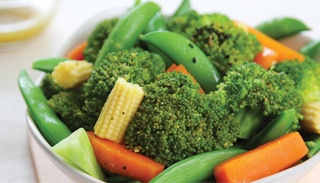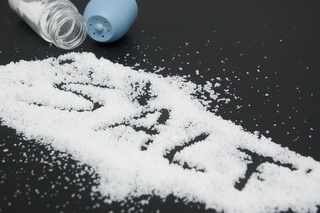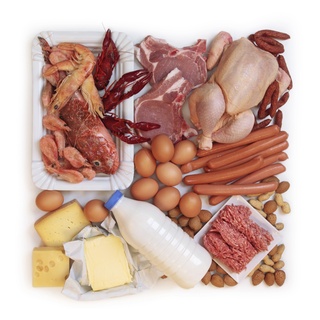What to Eat and What Not To

Food is not just the fuel that makes your body run. What you eat forms the building blocks for your cells. You really are what you eat. So, your food can, and does, affect your health. When you have CKD, one way to feel better and protect your kidneys is to take a fresh look at what you eat. See if you might want to make some changes to your diet. Your care team may give you some tips as well.
Foods that are close to nature like fruits, vegetables, nuts and seeds, beans and peas, whole grains, and lean meats are best for your body. Food that comes in a can, box, jar, or bag has been processed in a factory. Most processed foods have lots of chemicals, preservatives, and fillers (like wood pulp!). Some, like natural peanut butter, canned beans, or frozen vegetables, are good choices. How do you know which are good? READ LABELS. When a food has more than a few ingredients — or a “fresh” food, like meat or fish, has an ingredient list at all — be wary. Look for foods that have no more than five or six ingredients. You may want to make a fresh choice.
Most food cans in the U.S. are lined with bisphenol A (BPA). BPA has been linked with high blood pressure, diabetes, and obesity. Many canned foods tend to be very high in salt or sugar and highly processed, too. Glass jars or shelf safe cartons don’t have BPA.
Should you buy organic? Studies have found that organic foods may or may not be more nutritious than standard ones. But, organic foods don’t have the pesticides that standard foods may have. Also, genetically modified (GMO) grains are used in some processed foods. These have been shown to cause organ damage in rats. Organic foods do not have GMOs. If you can afford it, sure, buy organic.
Fast food and junk food are cheap and tasty. But… they may be made with poor ingredients or deep fried. Or, just one menu item may have enough calories and salt for a full day. Not used to cooking? Ask a friend to teach you, take a class, or watch cooking shows on TV or YouTube.com. (Put “How to cook ____” in the YouTube search bar to get quick tips.) There are lots of easy, quick recipes online. Or, many grocery stores have salad bars and other healthy choices.
Protein
Protein, fat, and carbohydrates are the three main parts that make up food. Protein is found in meats, nuts and seeds, dairy, and some vegetables. Your body must have some protein to build muscle, red blood cells, hormones, and much more. But, most people get far more protein than they really need. And, protein wastes can be hard on weak kidneys. The nitrogen in protein is removed by the kidneys as urea (blood urea nitrogen, or BUN).
Your doctor may ask you to follow a moderate protein diet. If so, you will need to learn to watch protein grams and limit your intake to about 1 gram per kilogram (2.2 lbs.) of body weight each day. A dietitian will help you to:
- Weigh yourself and divide by 2.2 to find your weight in kilograms.
- Learn the protein content of foods you like.
- Eat less meat and more vegetables.
- Watch your portion sizes so you stay in the right range.
- Find other foods to make up for any protein calories you might be missing.
If your kidneys ever fail and you do dialysis, your meal plan will change. You will need to eat more protein again to make up for what you lose during treatment. If you have questions about protein, ask your care team.
Phosphorus
Phosphorus is found in meat, poultry, fish, dairy, nuts, beans, and cola drinks. Weak kidneys can't remove as much phosphorus from your blood. Try to limit the amount of phosphorus you eat. You doctor may prescribe phosphate “binders” to take with each meal and snack. These take the phosphorus out of your body.
Salt

Your body needs some sodium (found in salt) to help control fluid balance and blood pressure. But, many of us get far more salt in our diets than is healthy. And, if your blood pressure is high, a high–salt diet can make it worse — and further harm your kidneys. Ask your care team how much sodium you should aim for in a day.
Salt has been used for hundreds of years to preserve and “cure” meats like bacon. Today, salt is still found in high levels in many processed foods. Know your daily limit and read food labels. Watch portion sizes, too.
There are low–salt options or home–made substitutes for many of these foods. Avoid salt substitutes — many have too much potassium to be safe for you with CKD.
Potassium
Healthy kidneys keep the mineral potassium in a very tight range in your blood. This is vital — since having too much or too little can stop your heart! When you have CKD, your kidneys can be less able to get rid of excess potassium and it can build up in your body to unsafe levels. Your doctor may ask you to limit potassium in your diet to keep you safe and protect your heart. Ask how much to aim for each day. The amount may change if your kidneys get worse. Some medicines, like diuretic (water pill) blood pressure pills, can change your blood level of potassium. You may need to have blood tests to check your level.
Some foods (like potatoes and squash) can be cut into small cubes and cooked to reduce the potassium. Bring the cubes to a boil and then drain. Add fresh water and bring to a boil again until cooked.
Fluids
While your kidneys work they need blood flow, so you need to stay hydrated. It does not “stress” your kidneys to drink fluids. You should not be told to limit fluids with stage 3 CKD unless you retain fluid and have swelling.
In general, drink when you feel thirsty. Most foods have some water in them, so don't worry about getting eight 8–oz glasses per day.
But, don't drink soda. A large study has linked drinking one or more regular sodas a day to kidney damage. A second large study found that two or more diet sodas a day can lead to kidney damage or make it progress faster.
Sugar and Starch
If you are overweight or have diabetes, eating less sugar and starchy food can have big payoffs for your health. Talk with your care team about how many grams of carbohydrates (carbs) to aim for each day.

Limit Shellfish and Meat
Research has found that a toxin called domoic acid in shellfish and some fish that eat algae can harm kidneys — in mice. People are not mice. But, the really troubling finding was that very tiny levels of the toxin could harm kidneys. Shellfish also have high levels of purines, which can be a problem if you have gout. So, it may be wise to cut back on shellfish if you eat it a lot.
Antioxidants May Help You
Every cell in your body needs oxygen. But, too much oxygen in the wrong places can “oxidize” and cause damage, a lot like rust. Anti–oxidants help protect your cells, and may help your kidneys. Ask your doctor if antioxidants like these. might be worth taking:
Fish oil can help slow CKD that is caused by a disease called IgA nephropathy.
Note: Talk to your care team before you take any supplement, vitamin, or over the counter remedy. When your kidneys don't work well, these can build up in your body to levels that could harm you.

